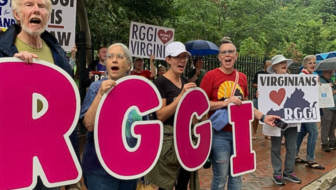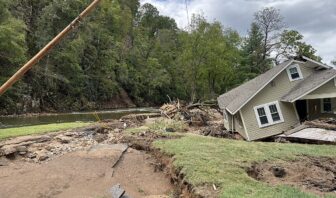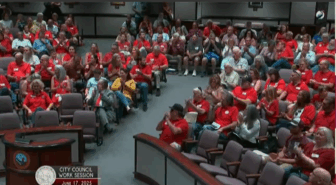For Immediate Release
March 13, 2013
Contact:
Kelly Trout, 717-439-0346, kelly@chesapeakeclimate.org
Mike Tidwell, 240-460-5838, mtidwell@chesapeakeclimate.org
Energized by close Senate committee vote on fracking moratorium bill, more than 100 concerned citizens attend morning rally at the State House in Annapolis, vow to continue the fight
ANNAPOLIS—Concerned Marylanders from across the state converged at the State House in Annapolis on Wednesday and vowed to continue their fight for legislative action to address the risks of fracking. Activists said they have more determination than ever after falling just one vote short of passing a bill to place a statutory moratorium on the controversial drilling practice in a Senate committee last week.
Wearing bright red t-shirts and resounding chants across Lawyer’s Mall, around 150 activists—Western Maryland residents on the front lines of drilling, nurses, students, teachers and grandparents—rallied with one message for their legislators: “Get to work now protecting our communities and climate from the harms of fracking.”
“Legislators dropped the ball this year, but we’re not giving up—we’re getting to work,” said Matia Vanderbilt, a thirty-year resident of Western Maryland and co-founder of Citizen Shale. “We’re asking legislators to give us the full protection of the law while studies of fracking’s risks are carried out. This is a common-sense step that’s vital for the health and safety of our communities. As it stands, we’re completely vulnerable, especially if the Governor’s executive order to study fracking expires in 2014 without its work completed.”
Last week, legislation to put a statutory moratorium on fracking in Maryland came just one vote short of passage—5 to 6—in the Senate Education, Health and Environmental Affairs committee, a sign of progress in itself, advocates said. This marked the first year that major fracking legislation was brought up in the Senate committee for a vote, following two legislative sessions that saw the House of Delegates pass fracking safeguards by wide margins.
In response, moratorium advocates said their statewide movement will only grow and push harder, and pointed to Wednesday’s rally as a sign of the increased pressure legislators should expect over the coming months. Recent polling indicates that a broad and growing majority of Marylanders—78 percent—back legislative action on fracking.
“We’re asking our legislators to get to work with us starting today because we can’t afford to let the clock run out on the Governor’s executive order without statutory protections in place,” said Mike Tidwell, executive director of the Chesapeake Climate Action Network. “Our communities don’t need more assurances. We need legislative action that guarantees strong protections for our water, health and climate.”
Keynote speaker Lois Gibbs, executive director of the Center for Health, Environment & Justice and the legendary mom-turned-organizer of Love Canal, New York, had this to say to the rally-goers: “It’s in the polluters’ interest to keep our communities from having the safeguards we deserve. We have to be our own advocates and remind our lawmakers that they work for us. Let’s get to work and make sure that all Marylanders are protected from the risks associated with fracking.”
If the risk studies ordered in Governor O’Malley’s 2011 executive order on fracking are not completed by August 2014, advocates underscored, Marylanders will have zero protection from gas companies who want to frack. Meanwhile, evidence is mounting in nearby states linking drilling activity to widespread health, environmental and economic impacts—including poor air quality, contaminated drinking water, rising health problems, increased climate-disrupting emissions, ruined infrastructure and falling property values.
The moratorium bill that came just shy of passing last week would have strengthened the governor’s executive order by guaranteeing that no drilling could move forward until: 1) thorough risk studies were completed; 2) time had passed to allow the public and legislators to respond; and 3) health and environmental regulations are in place. While Governor O’Malley put $1.5 million in his latest budget to fund the fracking studies outlined in his executive order, the money is unlikely to be enough to complete thorough risk assessments. Furthermore, without an actual statutory moratorium, legal experts warn that oil and gas companies could sue to force the state to proceed with drilling.
###
The Chesapeake Climate Action Network (CCAN) is the first grassroots, nonprofit organization dedicated exclusively to fighting global warming in Maryland, Virginia, and Washington, D.C. Our mission is to build and mobilize a powerful grassroots movement in this unique region that surrounds our nation’s capital to call for state, national and international policies that will put us on a path to climate stability.




